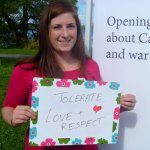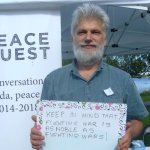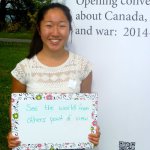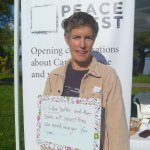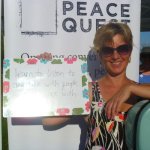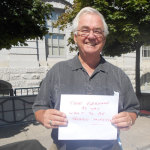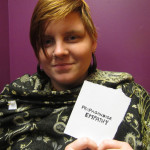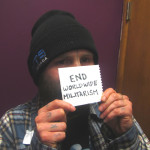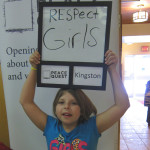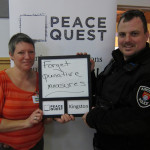Overlooked Attacks and Responding to Violence
by Jamie Swift
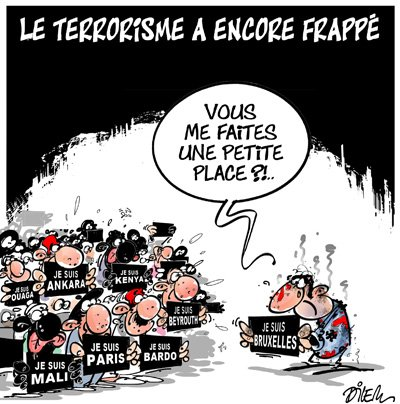
“Terrorism strikes again” Artist: Dilem Originally published in Liberte-Algerie March 23rd, 2016 and for TV5MONDE March 22nd.
“I felt like it was the end of the world.”
That was the reaction of one English speaking person who witnessed the chaos and carnage of the March 22 terrorist attack at the Brussels airport. As with many such outrages in Europe, the Canadian media provided blanket coverage of the Brussels violence that claimed the lives of some thirty people.
This is hardly surprising. We tend to be shocked by events that are inside our frame of familiarity. Many Canadians have passed through that airport. The victims look like us. Journalists are on hand, flocking to the scene. Horrific images are instantly available.
In August, 2015 an attacker opened fire on a high speed train travelling from Paris to Amsterdam. Three were injured before the gunman was subdued by three Americans were lauded as heroes. The event was at the top of the news.
A week before the train attack, a car bomb went off in the Sadr City district of Baghdad, killing at least 76 people. It was scarcely noticed in Canada.
Again, hardly surprising. The victims don’t look like “us.” Few Canadians have been to Sadr City. Particularly since the American invasion of Iraq that did so much to light the fuse on the violence that has ripped the Middle East apart, sending shock waves – and uncountable refugees – across Europe.
Such violence provokes different reactions. Grief, of course. Outrage, certainly. Fear, frequently. Solidarity, not so often.
Recall the murders of two Canadian soldiers in 2014. The two became instant heroes. Unlike those who stopped the train attack, they were innocent victims who had done nothing heroic. The killings were certainly tragic. And most all of us were sympathetic to those who had lost loved ones. Yet hardly an occasion for a spasm of patriotism.
Beyond the sympathy, grief, shock and fear, how do we react to terrorist attacks?
Here in Kingston, a group of PeaceQuest supporters responded to the murders of the soldiers by expressing fear. But it was not fear of getting shot or blown to pieces. It was fear of the sort of backlash that terrorists – “propagandists of the deed” – hope for.
“We are afraid that this country that we love will descend into mistrust, fear of neighbour, and expressions of racism and hatred.” They added that they were determined to “refuse to allow our grief to be interpreted as a call to war, and to stand fast for the pillars of respect, tolerance, welcome, and civil liberty that are the hallmarks of our nation.”
Canadians stood up in this spirit of generosity and solidarity in the aftermath of the terrorist attacks in Paris last fall. When a mosque was firebombed in Peterborough, Ontario, 1,700 people had contributed more than enough to repair the damaged worship space. They met the fundraising goal — less than two days after the attack.
A few weeks earlier, Canadians had responded with a tidal wave of generosity and good will to the photograph of the Syrian child who had drowned on a Turkish beach. The reaction undoubtedly affected the federal election result. Within months, 25,000 refugees from war and terrorism were welcomed to Canada.
Julian Firkin reflected this spirit of generosity and solidarity hours after returning from the Brussels airport. He had been close to the blast, seeing his partner off. The British expatriate, a long-time Brussels resident, described the panic, the screams, the smell of explosives.
Carol Off, host of CBC-Radio’s As It Happens, asked Mr. Firkin what he was feeling. He described the nature of terrorism. “It’s a very effective method of putting fear into people and stopping them from living their normal lives.”
Mr. Firkin described a woman whose leg had been sprayed with shrapnel. She screamed for him to remove her shoe. But he and his partner realized that her shoe was what was holding her foot together.
Then he said something remarkable.
“There’s a lot of nasty people who will jump on this and start posting stuff on line. There will be rumours and lots of hate speech and lots of anti-Islamic rhetoric bandied around. Donald Trump will jump on it and say that’s why we need to close our borders. That’s what sickens me and worries me even more than my own recovery from the trauma. I’m expecting to get some delayed shock….I know it sounds maybe a bit hippy and sort of right-on. But I just hope people can still love each other and be tolerant and accept people’s respect each other’s differences and not go crazy and start reacting in nasty ways.”
For more on this, see and compare the List of Terrorist Incidents found on Wikipedia.
